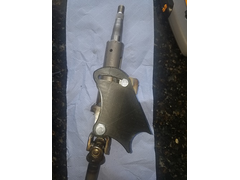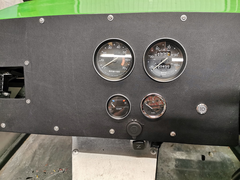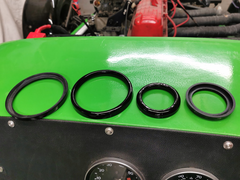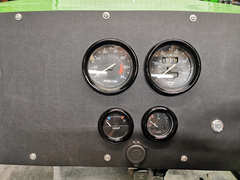lsdweb
|
| posted on 20/4/20 at 08:36 PM |

|
|
3D printing in Polycarbonate
Hi all
Hope you're keeping safe and sane.
I've been messing about with 3D printing in PLA and it's been OK. I'd like to step up to be able to print in polycarbonate and other
materials.
Most of what I want to do is small race car non-structural stuff - dash panels, switch panels etc. plus templating (I've just mocked up a pair
of steering column brackets that were fine and being laser cut in steel -
 
Description
).
I've currently got an Ender 3 budget printer and I know there are ways of upgrading this but I'm happy to buy something more up to the
job.
Any thoughts?
Wyn
|
|
|
|
|
bi22le
|
| posted on 20/4/20 at 09:55 PM |

|
|
I know a fair bit about 3D printing and additive manufacturing.
I mainly work with higher end professional Stratasys Polyjets, which blend materials and print to 0.05mm.
For home stuff I would look at the Prusa or Ultimaker set ups. Both FDM with good support networks.
Prusa m appears to be cheaper, more DIY but does not seem to hit the higher accuracy. Opposites for Ultimaker, I think they hit 0.25mm in X and Y
axis.
They are like cars so second hand is fine and probably best to keep costs down. Look for one that has been well maintained, has plenty of extras and
can still print to provide evidence.
Software is something to scratch up on. Also materials going forward. Some FDMs a now capable of printing glass filled and carbon fibre filled
filaments. Impressive stuff.
Track days ARE the best thing since sliced bread, until I get a supercharger that is!
Please read my ring story:
http://www.locostbuilders.co.uk/forum/13/viewthread.php?tid=139152&page=1
Me doing a sub 56sec lap around Brands Indy. I need a geo set up! http://www.youtube.com/watch?v=EHksfvIGB3I
|
|
|
watsonpj
|
| posted on 21/4/20 at 09:00 AM |

|
|
You can print PETG on you ender 3, the settings are a bit different to PLA with temps fr the bed and extruder being higher. This material is good for
car parts dash parts, air vents etc, headrests etc and is fine in direct sun unlike PLA which will breakdown over time.
I run petg at 230-240C with a bed temp of 90-95C and first layer has to be much slower typically 30% to ensure it sticks and really important no
cooling fans.
It has a tendency to string and zit so retraction is needed i have 5mm retraction but not really fast so about 25mm/s.
You also need something like hairspray,pritt etc on your bed as if it sticks it really sticks to the bed.
Obviously the setting will vary from printer to printer but the above should put you in the right ball park and then it time to play with the 3dbenchy
boat to tune the settings.
Petg isn't as strong as polycarbonate but its pretty good
best of luck
Pete
|
|
|
lsdweb
|
| posted on 21/4/20 at 01:51 PM |

|
|
Thanks guys.
Pete
Does the standard print head and tubing cope at those temperatures?
Do you need a cabinet to keep the heat in (I've got stacks of Celotex insulation slabs on our current (on stop) building project so could make a
'cabinet' out of that quickly.
I'll order a roll of PETG now.
Ta.
Wyn
|
|
|
watsonpj
|
| posted on 21/4/20 at 02:46 PM |

|
|
yes the standard print head is fine but you need to check if yours has a PTFE. I just looked up online and it looks like it does so 250C is the
absolute max.
No you don't need a cabinet i have a artillery X1 which is open frame but it does need to be somewhere where there are no drafts as the material
needs to stay hot enough that it doesnt shink back before it fully bonds with the layer below.
If in a drafty spot then use the celotex.
Getting pla working was really easy but the Petg did take a while a few wasted prints but once it was dialled in it was fine.
Pete
|
|
|
MikeR
|
| posted on 22/4/20 at 12:51 PM |

|
|
This has always fascinated me, what sort of costs are you looking at to get a machine and to run one?
|
|
|
BenB
|
| posted on 22/4/20 at 05:02 PM |

|
|
3d printer can range from anything from a few hundred to hundreds of thousands. And that's only looking at FDM type.
The Ender 3 is a very popular model. Personally I'm running an Anycubic I3 mega (upgraded to Mega S spec) and for PLA and ABS it's fine.
It has nothing like the following of the Ender or Prusa models (to name a few). The Mega S works well for flexible filaments though direct drive tends
to beat bowden cable for flexible filaments unless you're happy printing slowly.
IE lots of choice- all comes down to what you what to print, how much tinkering / how many failed prints you're happy to have.
Running costs aren't crazy. Replacement nozzles are cheap unless you go for the super expensive ones, same with filament.
I tend to be cheap and pay about £20 per kilo of filament which is enough for a healthy number of prints and so far I haven't had issues (though
some people will happily pay 2-3 times that for quite basic filament). It helps that I tend to shy away from anything esoteric like carbon impregnated
filament (especially because this rips up your nozzles).
So I guess ultimately the answer is "it depends what you what to print"
On a personal note though running the I3 mega and cheap filament I haven't spend much. I'd just buy a basic model like that and have fun
and while doing this you'll work out what you want to buy next.
Also don't forget that 3d printers are hackable and to an extent that's part of the fun. It's not a major job to change a bowden
cable printer into a direct drive beast capable of extruding a much wider range of filaments with an all-metal hot end.
|
|
|
lsdweb
|
| posted on 23/4/20 at 08:11 PM |

|
|
Thanks Pete
I've just received a roll of PETG (seems to be quite a shortage!) so I'll give it a go.
MikeR - you can pick up a model like mine (Ender3) pretty cheaply and they're great for messing around.
Regards
Wyn
quote:
Originally posted by watsonpj
yes the standard print head is fine but you need to check if yours has a PTFE. I just looked up online and it looks like it does so 250C is the
absolute max.
No you don't need a cabinet i have a artillery X1 which is open frame but it does need to be somewhere where there are no drafts as the material
needs to stay hot enough that it doesnt shink back before it fully bonds with the layer below.
If in a drafty spot then use the celotex.
Getting pla working was really easy but the Petg did take a while a few wasted prints but once it was dialled in it was fine.
Pete
|
|
|
harmchar
|
| posted on 24/4/20 at 06:49 PM |

|
|
Same here just bought small quantity of PTEG to see if it prints suitable quality for car parts. Just made bezel covers for my gauges as they have non
IVA friendly edges. Printed in ABS and painted satin black.
 
Description
 
Description
 
Description
Hope the photos show as that's my first try at uploading photos on here.
[Edited on 24/4/20 by harmchar]
|
|
|
lsdweb
|
| posted on 26/4/20 at 09:27 AM |

|
|
Clever!
quote:
Originally posted by harmchar
Same here just bought small quantity of PTEG to see if it prints suitable quality for car parts. Just made bezel covers for my gauges as they have non
IVA friendly edges. Printed in ABS and painted satin black.
pg]
Hope the photos show as that's my first try at uploading photos on here.
[Edited on 24/4/20 by harmchar]
|
|
|













